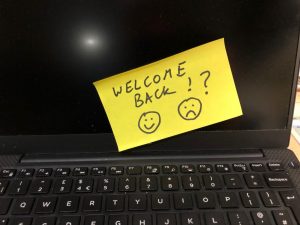Culture in crisis 4. Once the novelty wears off…
Aug 11th
In a crisis, people pull together. Competition and disagreements are swept away, replaced by collaboration to get things done. We often hear, ‘If only we could always operate the way we did in the crisis’.
Recent Pulse surveys across organisations show marked uplifts in scores on engagement and confidence in senior leadership along with other key metrics of a high-performing organisation. It’s as if they needed a terrible external crisis to strengthen purpose, collective leadership and motivation.
Feedback reveals changes valued by employees, including ‘Home working has shown we can be trusted’ and ‘This has shown that leaders care about our wellbeing’. Increased live communication and engagement with more team and individual meetings have been appreciated. Senior leaders have seen managers show abilities and qualities that previous ways of working had kept hidden.
This is a well-known phenomenon. Robert Schaffer asked in the 1980s how the ‘routine miracles’ achieved in organisations fighting for their life could extend beyond the short term. One way is to explicitly capture what people valued in lockdown and look for ways to translate it into improvements for the future.
One client who had found leadership team meetings unrewarding found himself much more energised and on the front foot in online meetings. Experiencing the difference is a base for making changes in team meetings as well as for individual behaviours.
The dispersed organisation will need more leadership at all levels to sustain the emotional intelligence that is part of effective organisations. Leaders will need to find more ways to develop the human connections that were previously missing.
One thing is certain: as organisations move out of the first challenges of adapting to the pandemic, the cracks will start to show. Tight command and control structures will quickly show themselves unequal to solving wider problems. Common purpose will weaken as difficult times continue and the novelty of new ways to work together wears off. Without everyday informal contact with leaders, peers and customers, people quickly lose energy.
To reduce the risk of organisational backsliding after the first heroic efforts, plan for the medium term while still dealing with the current crisis. The collective energy and commitment, the ‘Dunkirk spirit’ remembered in Britain, won’t last long – 100 days at the most.
What can leaders do to avoid false confidence?
- Re-imagine. Create a vision for a post-pandemic future. Interrogate how the world has changed, and how change might continue. Establish what that means to customers and other stakeholders to help re-define your purpose. Involve and engage people both internally and externally throughout, capitalising on digital communication opportunities.
- Make meaning. Articulate the future, capturing the learning from the crisis. Many have experienced greater empowerment and efficiency during lockdown, in both decision-making and implementation. Show this as a way forward for the future as well as the path out of the crisis. Make sure everyone understands the strategy and their role in achieving it. Share and involve everyone in the story.
- Align leaders. Many leadership teams are currently polarised. Some are eager to be radical and capitalise on this unique opportunity; others are reluctant to let go of the past, keen to ‘return to normal’. Prepare for challenges ahead by making sure your leadership is aligned with the vision and committed to an empowering approach.
- Take the learning. Listen to customers and employees, ask what they need now, be prepared to adapt quickly. The crisis has accelerated thinking in terms of structures and ways of operating. The war on siloes, factions and unhelpful rivalries needs to be stepped up across the organisation, as well as with external partners.
This is a collaboration between Stanton Marris and Nicholson McBride Change: Beatrice Hollyer, John Bruce-Jones, Jane Clarke, John Nicholson, Kirsty Hannah
www.nicholsonmcbridechange.com


